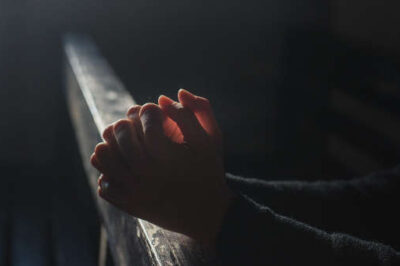We are in a kairos moment—a divinely ordained moment when history will describe and define this time by what happens here.
In mathematics and business, it is called a strategic inflection point. A strategic inflection point is a decisive moment in the apex of a curve, where such a level of resistance and disruptive change is occurring, that the response to the disruption alters the existing course and determines whether a new future trajectory is upward or deteriorates downward.
What makes this moment divine is the purposes of the Lord. Conditions and circumstances should not define a time. What God is doing, saying or allowing amid the conditions or through the circumstances is what provides the divinely orchestrated opportunity.
Some have said the events of these recent months have brought us into unprecedented times. I would submit that while certainly significant and magnified, they do have precedent.
We have had global viruses before. We have had racial unrest before. But something is certainly different this time. Is the adversary at work? Certainly; he always is. But it is God who is really at work, and we must not miss what He wants to show us.
In the 43rd chapter of the book of Ezekiel, God reveals His great displeasure with His people and in verse 10, He commissions Ezekiel to reveal it. “As for you, son of man, describe the temple to the house of Israel, that they may be ashamed of their iniquities. And let them measure the pattern.” In this one statement, the Lord directs the attention of His people back upon themselves for examination. As 1 Peter 4:17 says, ” For the time has come for judgment to begin at the house of God, and if it begins first with us, what shall the end be for those who do not obey the gospel of God?”
So as a Caucasian pastor, I must ask those of my ethnic group: Are we genuinely committed to change or just interested in diffusing the present expression of anger and pain from African Americans? You see, these are not the same. One affects us, the other protects us.
There is precedent. Things have proceeded the currently manifesting situation today. There is a pattern, and it is repeating itself. As a country, we find ourselves faced with yet another societal crisis because of another unjust expression of force toward a person of color. But that is not the only pattern present. Many of the same recurring responses from our Caucasian community have been present before. The same initial responses. The same prevailing attitudes. The same protective talking points.
One repetitive response is the immediate call for prayer from the white community. Make no mistake, prayer is an important thing. It is a critical thing. But as Caucasians, we always call for prayer in these situations. There are times that a call for prayer is merely a religious exercise, to ease the emotional pressure, to placate and preserve the status quo, with no power for real change. Prayer can also be a Spirit-initiated motion based in real repentance that releases specific revelation and leads to real transformation.
Speaking personally, as a man of God, I am already praying. I have been praying, as I know many have. So I will join you in your genuine Spirit-initiated calls to prayer if you will join me in a genuine commitment to action after we pray.
You see, faith without works is dead. 2 Cor 7:10 tells us that momentarily feeling sorry changes nothing, but it is true godly sorrow that works repentance. So, as the Scripture says in Matthew 3:8, we must, “bear fruit worthy of repentance.” We cannot recycle the same empty attitudes and suggestions that have proven fruitless in the past.
The Lord is calling us to genuinely examine our attitudes, our words and our actions. In Jeremiah 6:13b-14, the Lord once again rebukes His people, but this time He takes aim at prophetic ministry. “And from the prophet even to the priest, everyone deals falsely. They have healed also the brokenness of the daughter of My people superficially, saying, “Peace, peace,” when there is no peace.” He repeats this rebuke in Ezekiel 13, challenging the false prophets’ words that do not bring or reflect real peace and likening their actions as not bringing true healing, but akin to covering walls with untempered mortar.
Many of the repeated depictions of Dr. Martin Luther King Jr. from the Caucasian community are inappropriate, historically inaccurate and hypocritical. Dr. King was not accepted by the white community when he was alive. He was ostracized, rejected, arrested 29 times and plotted against at national level by the FBI. As whites, we always choose the “safe” or “moderate” person of color so we can use them as an example and leverage them against those blacks that we consider “radical” or unacceptable. The effect and purpose, unintended or not, is acting in a way to bring separation and create division in the black community.
We must be honest. Dr. King’s movement is now nostalgically promoted, but his life was snuffed out, no differently than the supposedly more radical Malcolm X. So, our Caucasian calls for “peaceful” protest appear to be just a smokescreen. San Francisco 49ers quarterback Colin Kaepernick only took a knee in a public stadium, peacefully protesting, yet he was demonized and robbed of his livelihood for his actions. So, in the end, as whites, we really appear to reject anyone or any movement that we believe threatens to bring genuine change. What we cannot control, we fear and often set out to discredit and destroy.
Likewise, we must stop trying to determine the response of the black community to their pain and generational wounds. We must let them grieve. Anger is a psychologically recognized, legitimate expression of the grief process. Many of us have experienced it and expressed it related to great loss. Yet, we require the anger of the African American community to take an expression acceptable to us and expect it to be measured, based only upon just an immediate incident. But the black community is in a perpetual state of generational grieving that never gets to heal, because their experience of oppression, new deaths and injustice in the system continues to add to it over and over again. The grief response of this country to the 9/11 bombings in New York was full of anger and destructive action toward those who were responsible, and also inappropriately toward many who were not. As a country, we adopted the mantra, “never forget”. But we do not recognize or permit the same privilege to the African American community. Instead we expect them to forget the past, move on without resolution and focus on the future. What an insensitive, uncompassionate, hypocritical, double-standard people we are.
As a pastor who has spent decades involved in racial reconciliation ministry, I am strangely relieved that this latest incident is occurring in the midst of this expected social distancing. It is preventing us from calling for the same symbolic but powerless pulpit exchanges and “Kum ba Yah” services to relieve our consciences and make us momentarily feel good, but which have proven to bring no lasting change.
As Caucasians, we must stop hiding behind “I have many black friends,” when what I really mean is that I have acquaintances that happen to be black. Friendship is an entirely different thing than an acquaintance. Genuine friendship requires a commitment to relationship, an intimate exchange of heart and ideas and a journey of common experiences. So, we need to truthfully examine, how many people of color do we daily, or regularly interact with at a genuine level? How many of their family conversations have we been invited into? How many of their life experiences have we shared? Is our, “I have many black friends” as genuine as the characteristics of the relationships with our white friends, or is it just protective conscience easing?
To correctly build, we must begin at the beginning. We must have a sound foundation. We must be the initiator of relationships. In many ways our accepted terminology of reconciliation infers that there was a previous ideal state to be restored to. But, the history of global ethnic relationships and those here in the United States is so damaged that what is really needed is a foundational work. We must begin by building genuine relationships with people of color. We must become so intimately acquainted with their lives that we begin to develop some level of empathy and understanding of what a black family experience in America is truly like.
A start would be by humbly asking an African American for help in dealing with our ignorance regarding their life experience and then listening carefully when they educate us. For those of us with real courage, ask them to be honest and tell us where we are ignorant or racist. It is arrogant for us to expect to be able to accurately see all the nuances and effects of a condition we have never experienced. We then must walk with them and act on what is learned. While it is not their responsibility to educate us, through genuine relationships an investment is made.
It is not enough to say we are against racism without including all its forms and expressions. Racism is more than the KKK and the “N” word. To genuinely commit to change, we must also separate ourselves from the unjust application of laws; unspoken prejudiced business discrimination; and racist political leaders, parties and policies that benefit us. You see, we cannot truly be against racism and still embrace the institutionalized systems that perpetuate it.
Our credibility is at issue. In these matters of the sin of racism and social injustice, we really have none. We say one thing and do another. If we expect our words to have credibility, we must model something different. It is disingenuous for us to talk about racism and unity from the “safety” of our all-white neighborhoods or churches. If we are truly committed to racial diversity and real unity, we need to move out of our comfort zones and take bold, pioneering steps.
Such as, moving into a community that is comprised of people of color. Or to leave the familiarity of the mostly white congregation where we are comfortable and seek to become part of a predominately black church where we are a “minority”. We must learn to be led by African American leadership, the way we have expected blacks to have to follow white leadership in society all their lives. An authentic witness is more than words. It is modeled. Until we are willing to become models and lead by example, all we are doing is talking.
This is a kingdom issue. If we are to be salt and light to the world, we must be different and do things differently than we have done them in the past. This generational dance we have been doing regarding inequity and racial issues has proven it does not work. Our recycled favorite talking points and playlists of emotional, placating “songs” for the relief of our uncomfortable circumstances must end.
In Matthew 11:17, Jesus rejects the manipulation of the leaders of His day and speaks to this very kind of dynamic, saying, “We played the flute for you, and you did not dance; we sang a dirge, and you did not mourn.”
As a man of God and as a Caucasian pastor, I am not dancing to those old tunes anymore. This is a kairos moment. The Lord is at work, He is speaking to His church and calling us to examine ourselves and truly deal with this sin and demonic stronghold. It is time to be fruitfully strategic. Will I pray with you?
Of course, I will, if it is a Spirit-initiated beginning. If I commit to pray with you, will you commit to act with me? {eoa}
Dr. Gregory D. Reynolds is the founder and senior pastor of House of Liberty Covenant Church, a multiethnic church in Cincinnati, Ohio. He has his doctorate in theology with an emphasis on biblical ethnical studies and has been shepherding for more than 24 years. Pastor Reynolds has long been a prophetic voice with a burden for truth and unity in the body of Christ and operates with a mandate from God to address the issues that bring error and separation within it. He has been married to his wife, Cheryl, with whom he shares senior pastoral leadership at House of Liberty, for 42 years. They have three adult children and have been blessed with 10 grandchildren.







Leave a Comment
You must be logged in to post a comment.